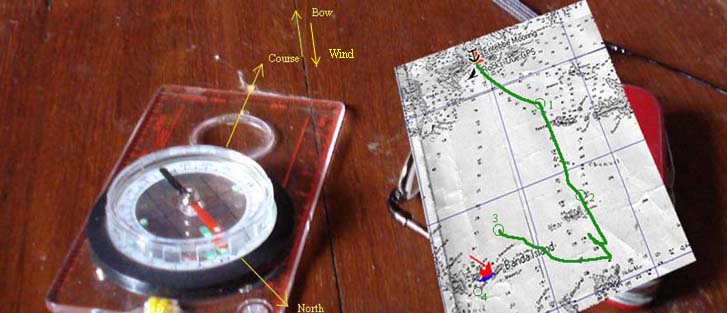
Crtd 09-03-10 Lastedit 19-05-18
Headwind
Bonaparte returns from Egypt

Forget it...: South wind: waiting two days at point 3. We judge wind changes from inside: on anchor in the absence of current wind comes from bow, and our compass is set on course. Beam reach is our best course.
Time to get back to Banda Island, 36 km South from Entebbe. Normal morning wind is off the cold land, hence North at Entebbe, afternoon wind is towards the heated land, hence South (details). Beam reach is the best course of a dhow. Normally this takes us one day, sometimes another morning. Our planned departure on March 6, "Day 0", was impossible due to an all day SSE. Day 1, after dark, we sailed out on a dodgy West turning Southwest. On day 2, after waiting all daylight, a night West took us from point 1 to 2 (see map on picture above). On day 3 a morning West took us to the Southernmost corner of our track and on an afternoon South, turning to South West we made it to 3. By then it was after dark, day 3. Day 4 and 5 saw us watching Banda 6 km straight up wind. 00:30 Day 6 we slipped through the channel between Banda and its East side neighbouring island Kitobo, did not make it to our mooring site and anchored two km South (point 4), hoping the morning wind would again be South instead of the normal North. It was! Under dark clouds, in fresh wind and drizzle we lifted anchor without sail and drifted to our Banda mooring South Bay.
Picture above: when waiting on anchor with headwind, Bonaparte takes power
When waiting with headwind my e-book prints of Thiers' history
books come out. [Wiki
on Thiers] [Thiers'
Gutenberg e-books] In the past half year[earlier
report], I finished his 10
volumes (published 1823-27) on the French Revolution, that is from the period when in 1789 Louis XVI
got in serious trouble until 1800 when Bonaparte (30 years old) takes power in
France. That was a bad day - I mean my day: what to do next? - but meanwhile the
Gutenberg web site producing Thiers' books already published
the first two of his 20 volumes (published 1845-62) about the Consulate and French Empire (1800-1815).
Lovely reading. I print the text download small letters two columns zero margins[view
sample]. Thiers is always in favour of the French (when they loose a
battle is it always either against an enemy army of at least twice the size, or
some fool was erroneously appointed - by some other fool, of course - in the
relevant ranks, scandaleux!). The
French motives are invariably noble (or at least "necessary" given the
circumstances), Pitt and the enemy princes are silly thugs, with the exception
of some generals which have to be praised because they regularly beat the French
troops where this is not obvious, for example the Austrian general archduke
Charles (also appreciated by Napoleon).
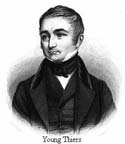 Thiers' moral and other sympathies
however, are in the adjectives and on the frames of his paintings, so to say.
We also have to take into account that even after publishing all of these first 10 volumes the poor boy was
just half my
age. His stories may not spread the light evenly, but where it spreads most often
the landscape is clarified. After all, apart from
Rabelais, who
mentions a
14-volume work entitled How To Serve Mustard After The Meal, nobody
will believe you can fill 30 volumes if you only
want to say who are the thugs and who are the nice guys. In the next 20 volumes I am,
Gutenberg willing, going to read, Thiers transpires to have gotten some better instruction in finance
and administration, so I suspected that in the meantime he might have had a practical job that made him learn. I checked his Wiki bio page[Wiki
on Thiers] and yes, he had been (1832-1839)
minister on different departments and prime minister under Louis-Philippe. We
are a strange lot, Bonaparte, Thiers and me! But let's not fly ahead of the
story.
Thiers' moral and other sympathies
however, are in the adjectives and on the frames of his paintings, so to say.
We also have to take into account that even after publishing all of these first 10 volumes the poor boy was
just half my
age. His stories may not spread the light evenly, but where it spreads most often
the landscape is clarified. After all, apart from
Rabelais, who
mentions a
14-volume work entitled How To Serve Mustard After The Meal, nobody
will believe you can fill 30 volumes if you only
want to say who are the thugs and who are the nice guys. In the next 20 volumes I am,
Gutenberg willing, going to read, Thiers transpires to have gotten some better instruction in finance
and administration, so I suspected that in the meantime he might have had a practical job that made him learn. I checked his Wiki bio page[Wiki
on Thiers] and yes, he had been (1832-1839)
minister on different departments and prime minister under Louis-Philippe. We
are a strange lot, Bonaparte, Thiers and me! But let's not fly ahead of the
story.
Bonaparte was 27 and had just, on his first high job, conquered Italy when he proposed to
hit the English in Egypt and assume control over trade to India. Such was decided and the
secret well kept. The English, with their entire marine fleet now back on the
Atlantic kept convinced that French Mediterranean
marine preparations were made to sail out Gibraltar and reinforce the French
Atlantic fleet. Half of May the French Mediterranean fleet went off, with
Bonaparte, to Egypt and only two weeks later the English started to seriously doubt whether the French were
heading for Gibraltar. Immediately admiral Nelson was ordered to enter, after a
year of total absence of English marine, the Mediterranean, and search and if
possible combat. My books suggested nobody was able to get that
information to Bonaparte, about to land at Abu Qir, near Alexandria and launch his troops
to Cairo (the French did have what they called "telegraph": lines of towers
within sight, able to pass messages by visible signs, mainly movement of craned
long metal arms, a short message from Strasbourg to Paris would take 10 minutes[more]).
Much later
Napoleon claimed that on departure with his army from his fleet at Abu Qir to Cairo he was considering
risks of English reappearance from outside the Mediterranean and told his admiral that his mooring was not
safe, that he should try to get in shallower water and that, if his main ships
would be to deep, he should head for Corfu. But we should be careful with this
imperial claim because it is made by a man who had, in 1796 in Italy, an enemy
battalion of 6000
surrender to a small group of French that he was only visiting, by lying that he was there with his
complete army!
Anyway, after looking in the Istanbul direction Nelson was told that the French fleet was
spotted at the Egyptian coast. The wind was Northwest. The French fleet was moored in
a West-East line in front of the coast. Nelson came from the wind side, had his
fleet divided in two lines, one to pass the moored ships on their starboard, the
other on their port sides. He made a spectacular firework. Few French ships
escaped.
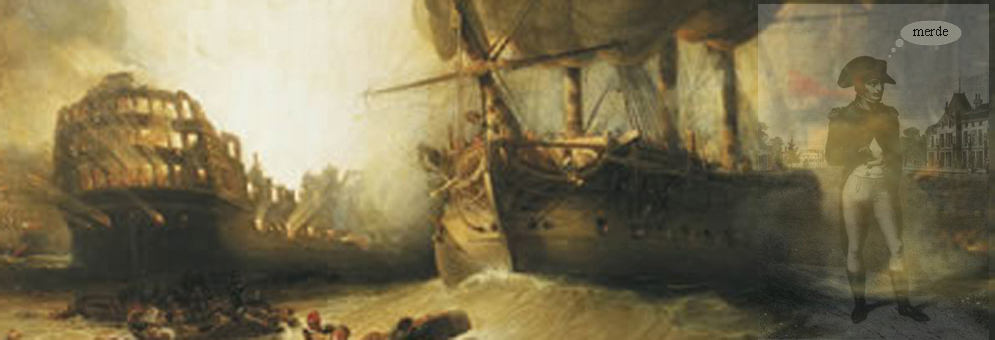
Abu Qir 1798: Unfortunate French fuck-up.
The English blocked the French from the seaside along
Egypt and started to
train and cooperate with the Turkish armies to contain them. After more than a
year of fighting hence and forth in the Middle East Bonaparte decided there was no
perspective on breaking the blockade, or doing anything else interesting. Nelson
had gone home. Bonaparte's new English military opponent Sidney-Smith sent newspapers for him to read that Italy was totally conquered
back by Austria with the help of the Russians. Bonaparte sneaked through the blockade in a small vessel.
At first he did not dare to land in Toulon because he was not sure whether it
was French or Austrian. But he was reassured on Corsica, and arrived in Paris. A few weeks
later he was first consul, head of government of France. The remains of the
French expedition army, after fooling around in
the Middle East for another two years, capitulated and were repatriated by British ships.
But that was long after Napoleon had made himself the absolute hero by crushing the
Italian wing of the Austrian army at Marengo (Alexandria) by jumping on them
with a secretly built up 40 000 army from the Col de Saint Bernard, of all
places (carrying all army equipment over the pass, think of the preps and
logistics!). Bonaparte was of course not seated on a horse,
backward looking, pointing to the peak, like that ![]() kitch-paintgun David depicted
him (click - for a good laugh -
the thumbnail left)
because he was the last one to climb (he wanted to stay in contact with Paris as long as
possible, after all, he now was the head of state too). He was dressed in a grey coat
and sitting on a donkey, in lively conversation with a
local mountain farmer chatting, unaware whom he was guiding, about the father of
his favourite girl who would not let him marry her because of the limited size of
his possessions. On the peak, the guide was given a letter for the North side
army staff who bought for him the plots he had indicated to the future victor of
Marengo. Bonaparte descended on Italy in local fashion, by gliding down over the
icy snow on his back side. Thus instead of David,
Daumier's Devil Descends on Earth
- unintentionally - gives a better idea. Another 20 000 French troops would
descend from other passes.
kitch-paintgun David depicted
him (click - for a good laugh -
the thumbnail left)
because he was the last one to climb (he wanted to stay in contact with Paris as long as
possible, after all, he now was the head of state too). He was dressed in a grey coat
and sitting on a donkey, in lively conversation with a
local mountain farmer chatting, unaware whom he was guiding, about the father of
his favourite girl who would not let him marry her because of the limited size of
his possessions. On the peak, the guide was given a letter for the North side
army staff who bought for him the plots he had indicated to the future victor of
Marengo. Bonaparte descended on Italy in local fashion, by gliding down over the
icy snow on his back side. Thus instead of David,
Daumier's Devil Descends on Earth
- unintentionally - gives a better idea. Another 20 000 French troops would
descend from other passes.
This entire operation was not without difficulties because I ran out of
printer ink.
March, 2009: shortage of printer ink! In the tropical heat of Banda Island history comes to a standstill in the freezing cold on top of the St. Bernard pass, May 1800. ... This would never happen to Bonaparte who even thought of how and with what to pull and hold cannons on the glaciers up there ... I can't even remember buying a cartridge!
While in successful lives people learn in simple circumstances what they later apply in vast matters, in mine this is the reverse: I learned how Bonaparte is taught by advisers not to force Moreau, general of the Northern wing in this war with Austria, on an aggressive Bonaparte-style tactics. Moreau was held to be a man you let work in his own more step-by-step style, or you fire him. Moreau was left free and pushed, in his own style, the Austrians' Northern wing behind the Inn. I, however, went the other way: I kicked Doi out. Doi evolved in the three years he was with me (we are not sure but we think starting from his 17th) from a brainless but loyal and enthusiastic crew member depicted on the special page I once devoted to him, always a big smile, to someone sitting in neat clothes, with creamed skin, playing with his cell phone, glum looking and every now and then, especially if far from me and Philemon, assuming an attitude of pervasive importance. Meanwhile he remained dangerous in any job without surveillance, and under surveillance remained so inefficient that indeed, once you had given up the idea of teaching him something, you could better leave him and do the job yourself. He had all chances to improve his capacities of a sailor and carpenter, but in three years learned nothing. In the past months I never saw him, ready to help, assisting attentively someone else doing a job let alone ask technical questions - which I can't remember he ever did. Instead, he started to stay far to avoid the risk of getting involved. He developed however a mastery on the mobile phone I gave him when he arrived, reaching and being reached by the whole of East Africa every day, though I never understood the purpose of those conversations (the regular reader may remember Doi's airtime incident more than a year ago). Recently he assumed the ambition to get his driving license. I have not understood in which car he wanted to drive. I surely would not venture mine. His latest idea was to go home to Tanzania for one and a half month. That sounded like a good idea to me, because I could give him a week or two to run around idle and then send him the message I was going to change my organization and he should find a job there. His English - Philemon heard him boosting to Johnny (who knows none), "I learned it all by myself, so I am very intelligent" - will be a notable asset, as well as his curious ability to charm people as long as he does not need to sweat for it. This is Doi. Take it or leave it. A bird flies off the nest, and though we are happy not to stand straight under, we shall of course keep checking Mwanza whether he does not need to be lifted from the sewers.
Fortunately for me, all Thiers' wisdoms come too late to make me slip in the abyss of some career. To illustrate, I am happy to compare my life down here with that of some more talented people. Cromwell (b. 1599) came out of English gentry obscurity at an age on which Napoleon (b. 1769) was already emperor for five years. Both make their crucial usurping moves (appointed general, dissolving parliament, assuming power) within 4 years, but Bonaparte makes them about 24 years earlier in his life than Cromwell. Unlike Bonaparte, who was disgusted by the French regicide and forbade its annual celebration, Cromwell had to kill a king. But Cromwell was neither dethroned nor killed (Napoleon may have been poisoned).
| Age*) | Cromwell | Napoleon | Age*) | Thiers | Me |
| 24 | Artillery officer, Toulon: he is lent an ear on his plan to overtake the most difficult stronghold of the English first, and he is vital to its execution | 24 | |||
| 25 | Given military carte blanche by the government official appointed to repress a right wing rebellion in Paris. With total success. | 25 | |||
| 26 | General of French "Italian" army, conquers Italy | 26 | First volume of French Revolution (1789-1800), 10 vols. appears | ||
| 30 | Member of parliament (1 year) | Dissolves parliament, Assumes power | 30 | Last volume French Revolution appears | |
| 33 | Crowned (emperor) | 33 | |||
| 35 | 35 | Ministries (4 years) | |||
| 39 | 39 | Prime Minister of France (3 years) | |||
| 41 | Member of parliament (2 years) | 41 | |||
| 44 | Army lieutenant commander | Defeated and dethroned 1 | 44 | ||
| 45 | Defeated and dethroned 2 | 45 | Starts working at Consulat&Empire (1800-1815), 20 Vols. | ||
| 51 | Among
the king's killers. General, quells Ireland |
Died imprisoned (suspect circumstances) | 51 | ||
| 54 | Dissolves parliament, Assumes power | 54 | |||
| 58 | Crown offered, he refuses | 58 | Reading Thiers, forgets to buy printer ink | ||
| 59 | Died in power, natural causes | 59 | ....?.... | ||
| 60 | Dug up for posthumous execution | 60 | ....?.... | ||
| 65 | 65 | Last Vol. of Consulat&Empire (1800-1815), 20 Vols. appears | ....?.... | ||
| 74 | 74 | President of France (1.5 years) | ....?.... | ||
| 80 | 80 | Died retired (natural causes) | ....?.... | ||
| ?? | ?? | ....?.... | |||
| Age*) | Cromwell | Napoleon | Age*) | Thiers | Me |
Bert tells more about the French revolution,
consulate and empire: click on the pictures):


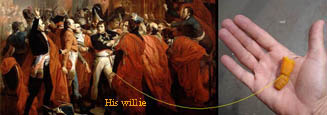
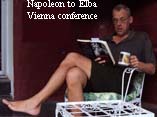
|
|
Bert tells about other reading: Go to:
 Bert
Tells
What He Reads
Bert
Tells
What He Reads